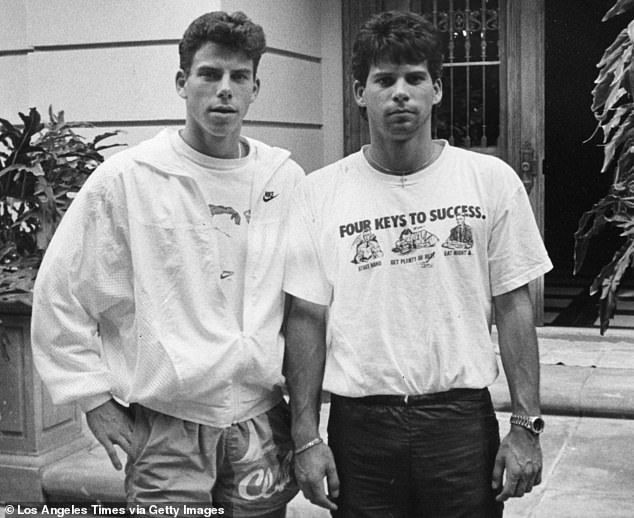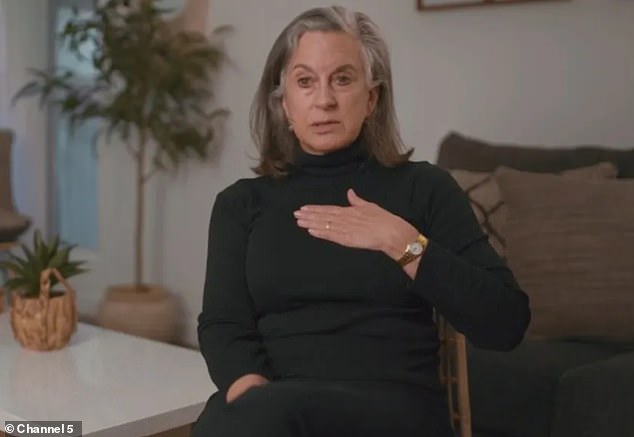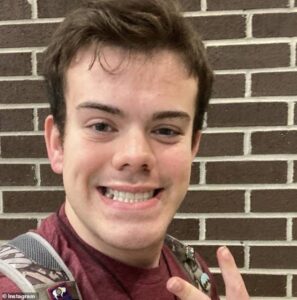By MARIA CHIORANDO FOR MAILONLINE
Published: | Updated:
Two brothers who have spent more than three decades behind bars after killing their abusive parents should be freed, a pioneering FBI agent has claimed.
Erik and Lyle Menendez are serving life sentences for gunning down their parents Jose and Kitty in their Beverly Hills mansion in 1989. They were sentenced to life without parole after being convicted of murder in 1996.
But the brothers, now 54 and 57, have ‘paid the price’ for their crime, been rehabilitated, and pose a ‘low risk’ to the public 36 years on, Professor Ann Burgess has claimed.
Prof Burgess, from Massachusetts, revolutionised criminal profiling and has applied her research to several serial killer investigations.
She was the subject various productions and articles, including the three-part-docuseries Mastermind: To Think Like A Killer.
She was working as a psychiatric nurse specialising in rape victimology in the 1970s when she was recruited by the FBI to help them understand the minds of violent sexual offenders and killers in order to catch them.
Speaking to FEMAIL about whether she believes Erik and Lyle should be paroled, Professor Burgess said: ‘I think they’ve done good work while they’ve been inmates, and they have been rehabilitated.
‘Those are part of the criteria on […] allowing them to be paroled.’


A petition to resentence the brothers was filed by former California District Attorney George Gascón last year, but he was defeated by Nathan Hochman in the November elections.
Blasting the brothers’ claims as a pack of lies, Mr Hochman has filed a motion to withdraw the resentencing petition. A hearing to address the motion to withdraw it will be held on April 11.
However, separate parole hearings will be held for the brothers in June, and clemency will be considered by Governor Gavin Newsom based on their prison records.
FEMAIL has contacted Mr Hochman’s office for comment.
In response to whether she felt they were at risk of re-offending, Professor Burgess added: ‘No, I don’t, because it [their crime] took place within a circumstance, a kind of situation where they felt that something awful was going to happen to them.
‘So […] they certainly wouldn’t be in that type of situation [again]. But you always have to look at the possibility of whether they would reoffend.
‘I’ve not seen any cases [within these circumstances] where that has happened […] I’d say the risk level is very low.’
Speaking to FEMAIL in more detail about why she feels Erik and Lyle have been rehabilitated, Professor Burgess discussed some of the work they have done while incarcerated.

She cited the Green Space Project they have created – a ‘beautification’ project where prisoners are encouraged to undertake activities including painting murals and cleaning shared areas.
In taking pride in their surrounding, it is believed that a sense of pride and responsibility can be fostered in participants, potentially helping them become rehabilitated and reintegrated into society.
Professor Burgess continued: ‘Lyle has run child abuse groups for inmates to help them deal with some of the issues there. I think those are all important.
‘Erik has been part of a rehab program.’
Erik has created four projects in conjunction with the Helping Without Prejudice foundation.
These include 12-Step Recovery with Insight Meditation, Insight Meditation, Life Care and Hospice, and VIVE (Victim Impact and Victim Empathy).
According to Professor Burgess: ‘They both have been able to maintain relationships with partners.
‘I think those are all important, and [….] I think the other important factor is the family has been very much supportive.’
Speaking about the case, the brothers’ high-profile lawyer Mark Geragos told FEMAIL: ‘I have never had a case, post-conviction, where not just the professionals, but the correctional officers have stepped forward in support of a client of mine.
‘We have correctional officers who work with these two men every day writing letters of support, saying that if they’re released – and they should be released – they would welcome them in their neighborhood.
‘To me, that’s astonishing.’


The current debate around whether the brothers should be freed follows decades of controversy around the case – during which Erik and Lyle were tried twice after the first trial ended with two hung juries.
During the first trial, Lyle and Erik – who were represented by legal powerhouses Jill Lansing and Leslie Abramson respectively – used the imperfect self-defense doctrine.
Under California law, this applies when a person kills in the mistaken but honest belief that deadly force was necessary for self-defense. A defendant can be found guilty of voluntary manslaughter rather than murder if the jury find imperfect self-defense was used.
Their teams argued that years of physical, emotional, and sexual abuse at the hands of their parents meant the brothers had an honest (but mistaken) belief that their lives were in imminent danger, which is why they gunned them down.
Family members, teachers and sports coaches spoke about witnessing the brothers experience neglect and abuse at the hands of their parents.
Meanwhile, a slew of expert witnesses (including Professor Burgess, who is no longer in touch with the brothers) and other psychologists discussed how the impact of neglect and trauma on a child’s brain means they live in a state of overdrive, with their fight or flight responses much higher than other individuals, and how they are more likely to see danger in situations, due to hypervigilance.
Despite a grand jury rejecting the allegation that the brothers intentionally killed their parents for financial gain, the prosecution argued the brothers had murdered their parents out of greed, wanting to inherit their wealthy entertainment executive father’s millions.
Arguing against their claims of sexual abuse at the hands of their father, prosecutor Pam Bozanich said during the trial that ‘men cannot be raped because they lack the necessary equipment to actually be raped’.

While Erik and Lyle were tried at the same time, they had separate juries. After the highly publicized, weeks-long event, both juries were hung, unable to agree on whether the crime was murder or manslaughter.
Undeterred, California’s District Attorney at the time, Gil Garcetti, pledged to try the brothers once more, confirming the prosecution would be seeking the death penalty.
The second trial – which started in June 1995, just eight days after the shock acquittal of OJ Simpson, who had stood accused of murdering his ex-wife Nicole Brown and her friend Ron Goldman, was very different to the first court outing.
Prosecuting lawyers Pam Bozanich and Lester Kuriyama were replaced by David Conn and Carol Najera, who vigorously pursued the death penalty.
There was only one jury for both defendants. In addition, the state’s high court ruled that the brothers could not invoke an imperfect self-defense. Under this ruling, the Judge – Stanley M. Weisberg – ruled there were no grounds under state law to allow the testimony of expert witnesses discussing the impact of ‘battered person syndrome’ on the defendants’ psyches, meaning there were far fewer expert witnesses for the defense.
It also meant that jurors could not return manslaughter verdicts: only convict them of first or second-degree murder or acquit them. And in another major change, video cameras were not allowed inside the courtroom.
In response to the judge’s ruling, Ms Abramson told reporters: ‘It was really shocking to me and outrageous that [Weisberg] did this. I’m surprised he doesn’t take out a rifle in the courtroom and just shoot them.’


The decision was criticized as political by some, including former judge and legal commentator Daniel Leddy who told A&E: ‘I think it’s political, the District Attorney’s office was shameful in this case. Given the fact that the majority of the jury did not support first degree murder.’
Mr Garcetti, the District Attorney at the time, was contacted for comment by FEMAIL.
The prosecution coined the term ‘abuse excuse’, prompting Abramson to tell reporters that: ‘We never argued that child abuse is an excuse for murder. What we argued is that child abuse creates a terrible fear.’
During the second trial, Erik spoke on the stand for around two weeks about the abuse allegations, though Judge Weisberg limited some of his testimony, in addition to limiting the defense’s number of witnesses. Lyle chose not to testify at the retrial.
As a result of the second trial, Lyle and Erik were convicted of first-degree murder, and sentenced to life without parole. Furthermore, they were separated. They would not see each other or even speak until 22 years later, when they were reunited at the R.J. Donovan Correctional Facility in San Diego in 2018. They are both currently in custody at the facility.
Over the years, they exhausted their appeals, and by 2015, it appeared the brothers had no further hope of ever facing a parole board.
But their story has shot to global prominence once more in recent years, when footage from the their first trial (which, unlike their second, included video cameras in the court room and was streamed on CourtTV) was watched by millions on YouTube during the Covid pandemic.


This spurred a new movement on TikTok: in a post me-too era, rather than ridiculing the brothers’ claims of sexual abuse, a younger audience were sympathetic to their plight.
In addition, their case, has been the subject of a recent Netflix documentary, as well as a fictionalized series by Ryan Murphy, both of which captured the attention of the public.
In October 2024, California’s then-District Attorney George Gascon filed a Resentencing Motion, authored by assistant district attorneys Nancy Theberge and Brock Lunsford.
The 56-page document noted that some 30 extended family members of Erik and Lyle attended a meeting with the DA’s office in which they expressed their ‘strong support of Erik and Lyle Menendez being resentenced’, and in which they ‘collectively confirm[ed] that the men were sexually abused by Jose Menendez when they were young children’.
These family members included the siblings of Jose and Kitty Menendez, as well as cousins of the brothers. Only one family member, an older brother of Kitty, who died earlier this year, opposed resentencing.
In addition, Roy Rosello, a member of 80s boyband Menudo, which was signed to RCA records, of which Jose Menendez was a top executive, recently signed an affidavit accusing Menendez of drugging and raping him when he was just 14-years-old.
After replacing former DA George Gascon last November, Nathan Hochman removed Nancy Theberge and Brock Lunsford from the Menendez review. They are currently suing Mr Hochman, accusing him of ‘retaliation, harassment and defamation’.
Announcing he would be calling to remove the resentencing petition in a press conference in March this year, Mr Hochman said: ‘After a thorough and exhaustive review of the over 10,000s of pages of trial transcripts from two months-long trials, of the 1,000s of pages of prison records, of the 100s of hours of videotaped trial testimony, of all relevant pleadings, exhibits and statements, as well as interviewing victim family members, defense counsel, prior prosecutors, and law enforcement and the applicable law, the District Attorney’s Office is prepared to proceed forward with the hearing on the Court’s initiation of resentencing proceedings for the Menendez brothers but we are requesting that the prior District Attorney’s motion for resentencing be withdrawn.
‘The basis for that request is that the prior motion did not examine or consider whether the Menendez brothers have exhibited full insight and taken complete responsibility for their crimes by continuing for the past over 30 years to lie about their claims of self-defense, that is, their fear that their mother and father were going to kill them the night of Aug. 20, 1989, justifying the brutal murders of their parents with shotgun blasts through the back of their father’s head, a point-blank blast through their mother’s face, and shots to their kneecaps to stage it as a Mafia killing.’
He accused the brothers of lying to invoke a self-defense doctrine, as well as accusing them of failing to take responsibility for the crime, and attempting to encourage witnesses to commit perjury.
He added: ‘The Court must consider such lack of full insight and lack of acceptance of responsibility for their murderous actions in deciding whether the Menendez brothers pose an unreasonable risk of danger to the community.’
Mr Hochman compared the brothers to Sirhan Sirhan, who assassinated Senator Robert F. Kennedy in 1968. When Sirhan Sirhan faced a parole board in 2021, his bid for freedom was eventually denied as he refused to take responsibility for his crime.
The legal team for Erik and Lyle have said the comparison is an unfair one, via their official written response to Mr Hochman’s petition to withdraw the resentencing motion.
The document states: ‘Despite initially admitting the shooting, and over the course of nearly a quarter century (from 1997 through 2021), Sirhan not only refused to accept any responsibility for the shooting, but he went even further, claiming he “did not commit the crime,” “he was innocent,” he was “not guilty of anything,” and he “was innocent of the crime” […] On this record, the Governor [Gavin Newsome] properly concluded that Sirhan still posed a risk to public safety.’


While the brothers, who were 18 and 21 when they shot their parents in 1989, initially denied the crime, they have since admitted to the killing, and their regret over the brutal slaughter on a number of occasions.
Among them, in 2017, Lyle told ABC: ‘I am the kid that did kill his parents, and no river of tears has changed that and no amount of regret has changed it. I accept that. You are often defined by a few moments of your life, but that’s not who you are in your life, you know. Your life is your totality of it… You can’t change it. You just, you’re stuck with the decisions you made.’
Meanwhile, when asked in 2016 by Larry King whether he regretted the killings, Erik said: ‘Immensely so, immensely so, not a day goes by when I don’t [wish] I could undo this or I could bring them back. It’s my unending regret and in a sense it’s my real prison.’
In an recent interview with TMZ, the brothers said that if they are freed, they plan to continue to work with inmates. Erik said: ‘What it is that I want to do in terms of my day-to-day life is much of what I’m doing in here. I want to be an advocate for people that are suffering in silence.
‘Lyle and I aren’t talking about leaving prison – should we be able to get out – and not looking back. Our lives will be spent working with the prison and doing the work that we’re doing in here, out there.’








